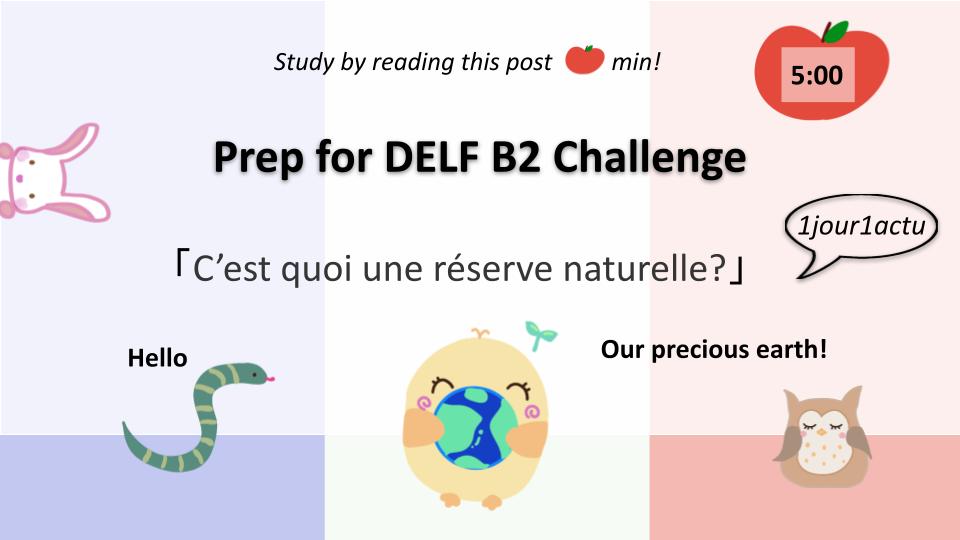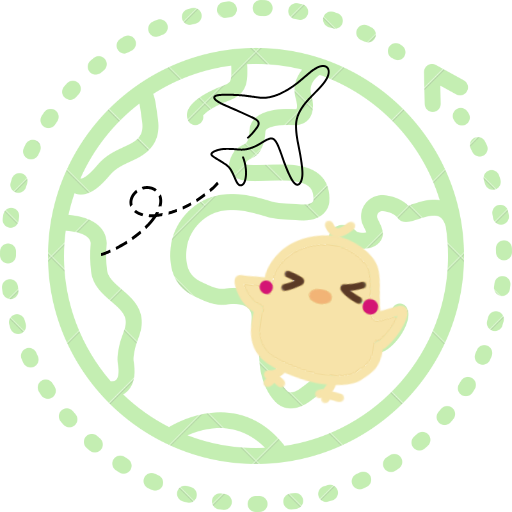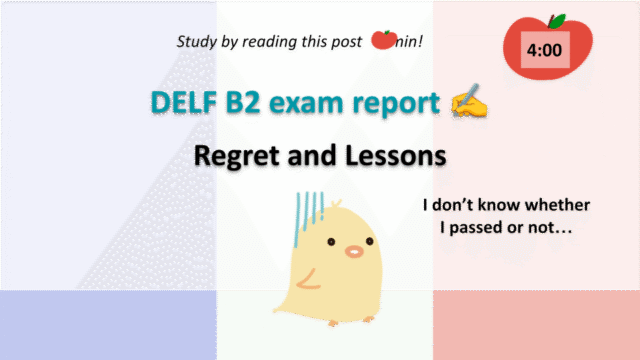🌿【DELF B2】What Is a “Réserve Naturelle”? | Learn French with Real Topics

My DELF B2 Preparation Blog – Listening & Writing Practice
This post is 5 minutes read time. Aiming for studying by just reading!
Learning French Through Real Topics: C’est quoi une réserve naturelle?– 1jour1actu
Understanding how to describe protected areas in French is vital for writing and speaking tasks at the B2 level. This topic links naturally to themes like biodiversity, climate change, and sustainable development—frequent topics in the DELF B2 exam. You’ll also pick up useful grammar (like tenir en laisse, servir à, and laisser) and vocabulary related to the environment.
📌Today’s Key Sentence|Let’s read and understand the original
Une réserve sert à protéger les êtres vivants dans leur milieu naturel.
Translation 👉 :
A reserve is used to protect living beings in their natural environment.
🔍 Vocabulary & Grammar Breakdown
| French | Translation | Explanation |
|---|---|---|
| une réserve | a reserve | A protected natural area |
| sert à | is used for | From the verb servir à meaning “to serve a purpose” |
| protéger | to protect | Regular -er verb, common in environmental contexts |
| les êtres vivants | living beings | Useful phrase for biology and ecology topics |
| dans leur milieu naturel | in their natural environment | milieu = environment; often used with naturel in environmental French |
📚Vocabulary Boost
| Expression | Meaning | Notes |
|---|---|---|
| une réserve naturelle | a nature reserve | Protected area for plants, animals, and landscapes |
| sauvage | wild | Often used in “vie sauvage” = wildlife |
| un sentier | a path / trail | Walking trails in natural areas; marked paths |
| cueillir | to pick (flowers, fruits) | Irregular verb; do not use in protected areas |
| tenir en laisse | to keep on a leash | Important expression for public/nature rules |
| laisser | to let / to leave | Very versatile verb; see Bonus section |
| un endroit | a place / location | Neutral word, can mean physical or abstract place |
| une espèce menacée | endangered species | Excellent phrase for ecology and biodiversity topics |
| creuser | to dig | Used when animals make burrows (un terrier) |
| un terrier | a burrow | Animal habitat term |
| une falaise | a cliff | Often used in geography or nature descriptions |
| une zone humide | a wetland | Protected and biodiversity-rich zone |
| une disparition | disappearance / extinction | Often used for species in danger (en voie de disparition) |
| entretenir | to maintain | Important for describing tasks of forest rangers |
| un garde | a ranger | Person managing the reserve |
🎁 Bonus|How to Use tenir
Tenir = “to hold,” but also appears in many idiomatic expressions.
🟩 Most relevant in this article:
- tenir en laisse = to keep on a leash
→ Les visiteurs doivent tenir leur chien en laisse.
→ Visitors must keep their dog on a leash.
🟦 Other useful uses:
- tenir bon = to hold on (emotionally or physically)
- tenir à [qqch] = to care about something
→ Je tiens à la protection des animaux.
→ I care about animal protection.
🎁 Bonus|How to Use laisser
Laisser = “to let,” “to leave,” or “to allow.”
🟢 Examples:
- laisser + infinitive → Je vais laisser les enfants planter un arbre.
→ I’ll let the children plant a tree. - laisser + noun → Il a laissé ses affaires dans la réserve.
→ He left his things in the reserve.
🟠 In negative form:
On ne doit pas laisser les déchets.
→ We must not leave trash behind.
🔧 Grammar Focus | Key Structures for B2
🔹 Structure: servir à + infinitif
- Meaning: to be used for (doing something)
- Use in writing: Great for explaining the function or purpose of something.
✅ Example:
- Cette réserve sert à protéger les espèces menacées.
→ This reserve is used to protect endangered species.
📘 Essay Expressions | Ready-to-Use Phrases
| French Expression | Example in French | English Translation |
|---|---|---|
| Il est important de… | Il est important de respecter les règles dans les réserves naturelles. | It is important to follow rules in nature reserves. |
| On a pour but de… | On a pour but de préserver la biodiversité. | Our goal is to preserve biodiversity. |
| Grâce à… | Grâce à la réserve, les animaux peuvent vivre en sécurité. | Thanks to the reserve, animals can live safely. |
| empêcher quelqu’un de… | Les gardes empêchent les visiteurs de cueillir des fleurs. | Rangers prevent visitors from picking flowers. |
🖋️ Practice Writing | Short Essay Prompt
Sujet : Penses-tu qu’il est nécessaire de créer davantage de réserves naturelles pour protéger l’environnement ? Pourquoi ?
(Do you think it’s necessary to create more nature reserves to protect the environment? Why?)
✍️ Model Answer (DELF B2 style):
🟦Introduction
Aujourd’hui, l’environnement est en danger à cause des activités humaines. Les réserves naturelles sont une solution efficace pour préserver la biodiversité.🟩Développement
Tout d’abord, ces espaces permettent aux espèces menacées de vivre dans un endroit protégé. Par exemple, la loutre ou la vipère aspic peuvent y creuser leur terrier en paix.
Ensuite, ces réserves éduquent aussi le public. Les gardes organisent des activités pour sensibiliser les enfants à la protection de la nature.
Enfin, elles limitent les actions humaines nuisibles grâce à des règles comme tenir son chien en laisse ou ne pas laisser de déchets.🟧Conclusion
En conclusion, il est indispensable de créer davantage de réserves naturelles pour protéger la faune, la flore et sensibiliser la population.
Translation:
🟦Introduction
Today, the environment is at risk due to human activities. Nature reserves are an effective way to preserve biodiversity.
🟩Development
First, these areas allow endangered species to live in a protected space. For example, otters and vipers can dig their burrows in peace.
Next, reserves also educate the public. Rangers organize activities to raise children’s awareness of environmental protection.
Finally, they reduce harmful human actions thanks to rules such as keeping dogs on leashes or not leaving trash.
🟧Conclusion
In conclusion, it is essential to create more reserves to protect wildlife, plant life, and raise public awareness.
✅ Test Yourself | Final Quiz
Q1. What does “tenir en laisse” mean?
a) to leave on the ground
b) to keep on a leash
c) to dig a hole
✅ Correct answer: b
Q2. Complete the sentence: Il ne faut pas ___ les fleurs dans une réserve naturelle.
a) cueillir
b) tenir
c) creuser
Q3. What does “une espèce menacée” mean?
a) a common plant
b) a protected zone
c) an endangered species
Answer
Q1. a) a sample
Q2. c) lors de
Q3. b) To ensure the preservation of the oceans
Q1. b) to keep on a leash
Q2. a) cueillir
Q3. c) an endangered species









Leave a Reply